Creative sharing sparks new ideas about church
By Melissa Lauber
UMConnection Staff
“It only takes a spark…” goes the praise song. On March 11, more than 360 sparks were ignited as clergy and lay people from the Washington Region gathered at Leadership Days to ignite new ways of doing and being church designed to transform lives and create thriving communities.
The flames were lit in a series of seven Spark Talks, resembling TED talks, whose content spanned the spectrum of discipleship.
The talks were part of a day of continuing education, with workshops in the afternoon. Each region in the Baltimore-Washington Conference holds these Leadership Days to provide learning opportunities for church leaders.
Methodism’s founder John Wesley was already well into his ministry when he had an experience at Aldersgate and his heart was strangely warmed, noted Washington Region strategist Christie Latona, who prayed that hearts would catch fire that day.
“If you have a spark, you can pass it on. It gets passed from person to person. It gets passed when we talk with the love of Christ,” Latona said, “sowing the good news of the Gospel everywhere we go.”
Smoke in the Youth Room
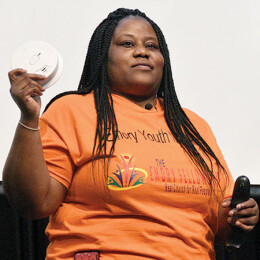 Sharon Milton, the Youth Ministries Director at First UMC in Hyattsville, was first to take the stage at Reservoir High School. She was joined by 17 youth from the Washington Region, who enacted their frustrations with adults in their churches who are afraid of the chaos that might accompany new things and who prize tradition over experimentation.
Sharon Milton, the Youth Ministries Director at First UMC in Hyattsville, was first to take the stage at Reservoir High School. She was joined by 17 youth from the Washington Region, who enacted their frustrations with adults in their churches who are afraid of the chaos that might accompany new things and who prize tradition over experimentation.
Too often, Milton said, the church’s youth are like smoke detectors – when they initially sound off, people pay attention, but they quickly muffle and silence them to go about life as usual. Sometimes, people even go as far as disconnecting them, so that they won’t be bothered in the future.
“We can be vision killers and not even know it,” said Milton. “We need to let them sing the song as God has given it to them.”
The youth shared their dreams and offered the church a message: “Let the fire burn.” Let it blaze!
Prayer is the Engine for Change
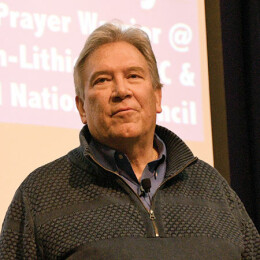 Don Floyd, is the retired CEO of 4-H. He’s traveled to more than 60 nations and spoken with an executive’s voice, but it’s the
Don Floyd, is the retired CEO of 4-H. He’s traveled to more than 60 nations and spoken with an executive’s voice, but it’s the
An important part of Floyd’s faith walk was as a founding member of Bridgeway Community Church in Columbia, which started with 20 blue chairs in a Howard County College meeting room. As one of the church’s five leaders, he remembers there were never agendas or votes. The leaders met, prayed to ask what God wanted, “then we made the decision on our knees,” he said.
Today, that congregations
Floyd is now a member of Linden-Linthicum UMC in Clarksville, which recently had a prayer campaign that led to the church raising $650,000 to retire substantial debts, and he experienced the power of prayer in his personal
Always pray, Floyd said. “Always be fearless ambassadors for Jesus Christ, as he alone changes lives.”
From Bias to Belonging: Change Yourself, Change the World
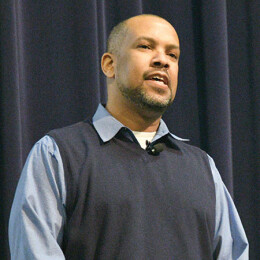 “Every child needs at least one adult who is irrationally crazy about him.” This sentiment inspired Dushaw Hockett to believe he could change the world.
“Every child needs at least one adult who is irrationally crazy about him.” This sentiment inspired Dushaw Hockett to believe he could change the world.
Hockett, the executive director of Safe Places for the Advancement of Community and Equity in D.C., assists people in recognizing and addressing bias as a critical step in communities of Hope — healing, opportunity
Implicit bias, he explained, gets in our way of seeing each other.
Implicit bias operates on a subconscious level, is contrary to our conscious beliefs about who we are, and is triggered in rapid and automatic associations. It filters how we see the world, often in ways we’re not aware of.
A significant amount of harm in situations involving racism and discrimination
Information about implicit
‘A Young Adult and a Skeptic Walk into a Church’
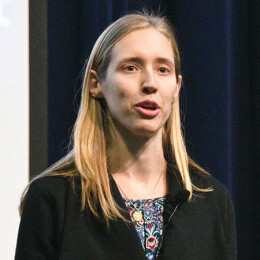 The Rev. Bonnie Scott’s Spark talk began in a way that sounded like the start of a joke – but nothing could be more serious for churches today than reaching out to skeptics and young adults.
The Rev. Bonnie Scott’s Spark talk began in a way that sounded like the start of a joke – but nothing could be more serious for churches today than reaching out to skeptics and young adults.
Being real — practicing authenticity — is the key, said Scott, pastor of Trinity UMC. “I don’t claim to have found the truth,” she said, “but I know it has found me.”
As a pastor, she shares that truth, putting aside the “pretty faith,” with its “thees” and “thous,” and speaks to people’s pains, confusion, fears and pride with honesty, humility, trust
Scott remembers as a new pastor being asked by a woman to do the funeral of that woman’s daughter and two-year-old granddaughter, who
It felt like an impossible funeral homily to write. “What do you say in situations like that?” she asked.
But, standing at the intersection of life and death, she shared the story of Jesus raising his friend, Lazarus, from the dead. Scott realized she just needed to share her humanity, the idea that Jesus was human too, and that the mourners’ questioning had a place in Jesus’ arms.
“This was an unfair tragedy,” she told them, recounting how Jesus had wept at his friend’s death. “So there’s something very holy about your tears this morning.”
She also noted the domestic abuse that had been experienced. When Jesus raises Lazarus, he unbinds him,” Scott said. “Natalie was bound in the shackles of domestic abuse,” and while we grieve the tragedy, she’s been set free. “God said, ‘unbind her.’”
That language of humility and honesty is the native tongue of skeptics and young adults, said Scott.
One of her colleagues questioned if mentioning the abuse was “risky.”
But “this was the reality that was on everyone’s mind,” Scott said. “What kind of person would I be if I didn’t name that reality and wrap it up in
Be the Bible
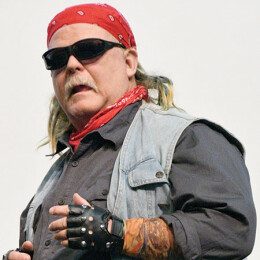 With arms full of tattoos, long hair wrapped in a bandana, torn jeans, chains
With arms full of tattoos, long hair wrapped in a bandana, torn jeans, chains
“When I get off my motorcycle down the street, none of you want to talk about Jesus,” said Fry.
But, he confessed, he does praise God that somebody talked to him about Jesus. “Somebody took that risk,” he said, “I was on a path straight for hell.”
As he spoke, Fry subtly began a transformation. First, he peeled the tattoo sleeves from his arm, he replaced his clothes with an outfit of jacket and tie, and removed the blond wig and bandana, unveiling himself as the Central Maryland District Co-director of Lay Servant Ministries.
“What are you going to tell me about your Jesus,” Fry asked again. “Will you tell me now that I look like you?
He encouraged the laity, especially, to take church outside of its four walls. “In the vein of the old circuit riders, we need to take a look out there,” he said.
Incarcerated and troubled youth, seniors in nursing homes, people in rehab centers, students in schools, and even those standing with us in line at the WalMart — all these people are thirsty for a word from Jesus and they won’t come into your church,” Fry said. “You can’t reap a harvest sitting in the barn.”
Ignite Creative and Artistic Ministry: Dream BIG!
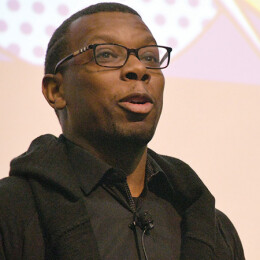 When he was younger,
When he was younger,
“I’ve always been a little different,” said Jenkins, who pastors Ebenezer UMC in Washington. Church and his grandmother helped him to value the things that made him different. But his life changed forever when he saw the musical “Dream Girls.”
“I found my people,” he said.
Jenkins studied the performing arts
“The God you serve is an artist,” Jenkins said. However, he warned, the arts are not a trendy thing for churches to do as a gimmick. “They are methods of engagement.”
He offered those at the Leadership Days some instructional advice about doing arts ministries, including the absolute importance of thorough rehearsals, the need for all participants to be available and faithful, and a reliance on the Holy Spirit.
He evoked the story when God asked Moses, “What’s that in your hand, a stick or a staff?” Our Creator God has given you power, Jenkins told those present. Things that appear ordinary can turn into miracles. “It’s time to be gathering sticks and turning them into staffs.”

